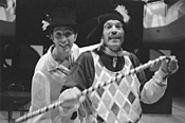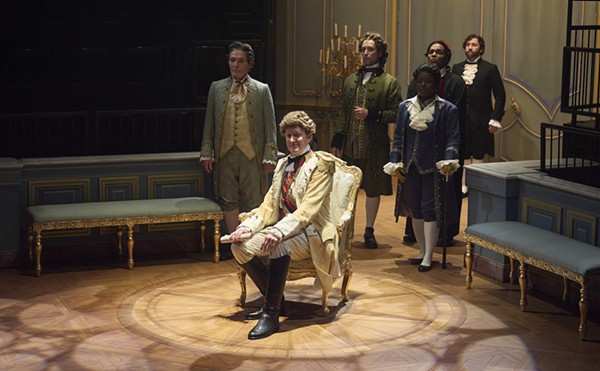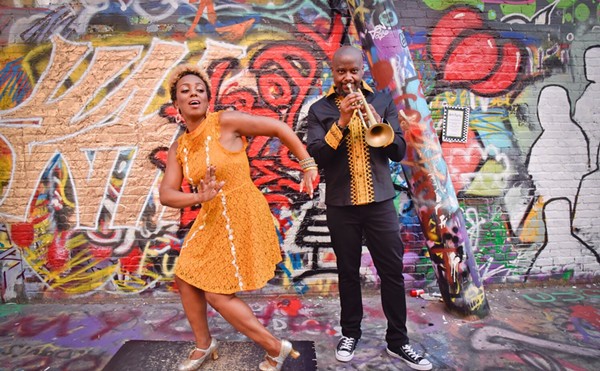Here's an unlikely concept for you: A clown, a fool, and a tramp journey to find love -- all the while singing the ancient Song of Songs and throwing in anachronistic impressions of Bogey, Bergman, and Dietrich for good measure. Clearly, this would have to be the most irritating theatrical concept since Roberto Benigni was green-lit for the live-action Pinocchio.
Consider that CPT's resident company has based this work largely on 19th-century playwright Georg Büchner's love story Leonce and Lena, which -- as a German work of commedia dell'arte, the Italian theatrical style involving slapstick and farce -- is already a bit of a freak accident. Add, as the program touts, some music from the Hebrew Bible and random other thoughts on love, and you would seem to have a train wreck on your hands. And yet somehow the New World Performance Laboratory has made this crazy quilt work in its production of Love in the Time of Lunatics, now playing at Cleveland Public Theatre.
The show isn't a breeze to decipher. But to its credit, it offers infectious energy, some compelling dialogue, and performances by three pros who can fill up a stage. (A good thing, too, since it's fairly bare-bones throughout the show.) They are also adept at employing the conventions of commedia dell'arte: Dressed like a clown, harlequin, and lady, respectively, the actors mug with the best of them.
Büchner's basic story line, and thus the plot of Lunatics, is quite simple: Melancholy Prince Leonce (constantly attended to by his loquacious servant Valerio, Shakespeare's Falstaff redux) is commanded by his father to marry Lena, a princess from another kingdom. This arranged marriage royally pisses off both Prince and Princess, so they both bust out to seek their own partners. Then, down the road, they meet by accident and -- you saw this one coming -- fall for each other, not knowing each other's true identity.
Okay, you've already seen that movie/ play/TV show. But in this case, what might otherwise be Plot No. 2-A is enlivened by Büchner's writing, which has a contemporary snap ("Do you love me because you're bored?" "No, I'm bored because I love you") and a way with clever if cluttered metaphor: A character never says he is feeling kind of low, for example; he says, "My head is an empty dance hall, with burst violins in the corner." Pop-culture references, another commedia dell'arte convention, also keep the proceedings lively. At one point, the lovers speak in the closing dialogue of Casablanca, and another time, Princess Lena does a sultry sendup of Marlene Dietrich's Blue Angel.
The play ain't an exercise in subtlety, to be sure. When the characters are happy, they croon to the skies and dance with wild Ed Grimley abandon; when sad, they climb a tower and threaten to plunge to their deaths. As a result, the script can occasionally get a little bipolar in terms of mood, and the language can get as awkward as Dubya navigating a simple declarative sentence. But overall, the exaggeration works to create a sense of gaiety that isn't often found in experimental theater.
Colombian Jairo Cuesta, the troupe's co-artistic director, plays the harlequin Valerio with the lithe physicality and rubbery facial expressions of a long-lost Marx brother. He also does a dandy rendition of Jimmy Durante's Inka Dinka Doo. Prince Leonce, dressed as a clown, is played by Italian actor Salvatore Motta, a man who couldn't look more vulnerable and wan. The third actor is Debora Totti (also Italian), who plays the supposedly sensuous Lena with a heavy stride and deadpan face. Her song, "Falling in Love Again," in the style of Marlene Dietrich, is spookily on target.
This work can hardly be considered an intellectual exercise, and it doesn't try to be one. But it succeeds on a visceral level, conveying the extremes -- both aching agony and rich deliriousness -- that love can spark.
Director James Slowiak has brought many threads together. Give the man considerable props for the effort, although any audience member in search of a linear story line may begin to hyperventilate about halfway through. But for those who enjoy their theater with a twist, Love in the Time of Lunatics is a small treasure.













